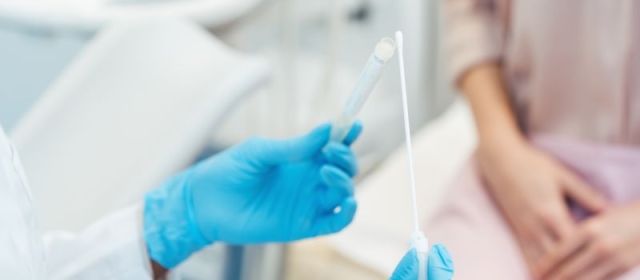
All News
Upcoming Events

Vulvodynia is a chronic pain condition affecting the vulva that lasts at least three months and has no clear cause. A common type, localized provoked vulvodynia (LPV), involves pain triggered by contact, such as sitting, wearing tight clothes, or sexual activity. This condition can significantly impact physical and emotional health, relationships, and quality of life. Despite vulvar pain affecting an estimated 10%-28% of women, many do not seek treatment, leading to underreported prevalence.

Sperm quality is an essential factor in male fertility, and lifestyle choices can significantly influence it. Sperm quality is commonly evaluated based on parameters like count, motility (movement), morphology (shape), and DNA integrity. Factors such as diet, exercise, stress, sleep, and exposure to toxins play vital roles in determining the health of sperm.

Sexual Medicine Open Access (SMOA), owned by the International Society for Sexual Medicine (ISSM) and published by OUP, is seeking applications for the position of Editor-in-Chief.
About Sexual Medicine Open Access
Sexual Medicine Open Access (SMOA) publishes multidisciplinary clinical, basic, and epidemiological research to define and understand the basis of sexual function and dysfunction in diverse populations. The open access format of Sexual Medicine ensures that accepted manuscripts will be rapidly published and fully accessible by interested healthcare professionals worldwide.
Why Apply?
- Editorial Vision: Develop a compelling editorial strategy to shape the future of the SMOA, promoting innovation, diversity, and the highest quality content.
- Thought Leadership: Drive the journal's focus on emerging trends, groundbreaking research, and thought-provoking articles, positioning it as a leader in the field of sexual medicine.
- Publication Excellence: Oversee the timely publication of six high-quality issues per year, ensuring adherence to rigorous publication standards.
- Collaborative Networks: Foster collaborations with leading experts and institutions to expand the journal's network and influence, driving advancements in sexual medicine research and practice.
- Recognition and Impact: Establish yourself as a respected thought leader in the field, working closely with a distinguished editorial team to shape the journal's direction and uphold its exceptional reputation.
Responsibilities:
As the Editor-in-Chief, your responsibilities will include:
- Ensure the quality and relevance of each publication, making decisions on all manuscripts, and overseeing the peer review process to maintain high reporting standards.
- Determine the suitability of manuscripts, including those redirected from other journals such as JSM, for publication in SMOA.
- Work closely with the ISSM Publications Committee and Board of Directors to align the journal's direction with the broader goals of ISSM.
- Explore and implement cutting-edge methods for online content delivery to enhance accessibility and engagement with the journal's audience.
- Dedicate sufficient, regularly scheduled time to the journal's success and engage actively with the Managing Editor's office to optimize publication processes and outcomes.
- Shape the content and composition of each journal issue to ensure the publication of high-quality research.
- Publish a wide range of topics covering multidisciplinary clinical, basic, and epidemiological research.
- Stay updated on emerging trends and advancements in various fields of study relevant to sexual medicine.
- Ensure a thorough and fair review process for all submitted articles, maintaining high standards of academic integrity.
- Work closely with a team of editors to assign reviewers and make informed decisions regarding manuscript publications.
- Communicate effectively with the Managing Editor to enhance publication quality, improve the author experience, and expand readership.
- Prioritize the journal's growth, consistently striving to enhance its impact and reputation within the scientific community.
- Embrace a forward-thinking mindset and anticipate future advancements in the field, preparing the journal to adapt and evolve.
- Foster collaboration with other journal editors and encourage teamwork among editorial staff to foster a cooperative and productive working environment.
Requirements:
Applicants for the Editor-in-Chief role should meet the following criteria:
- Expertise and Qualifications: Hold a postgraduate qualification/experience (Ph.D., M.D., or equivalent) in sexual medicine, urology, andrology, gynecology, psychiatry, or a related discipline with a balanced understanding of sexual function and dysfunction across genders..
- Proven Leadership in the Field: Demonstrate significant editorial experience and thought leadership with a robust publication record.
- Editorial Experience and Skills:
- Have previous experience serving on editorial boards or in editorial leadership positions, showcasing a proven track record in managing publication processes.
- Familiar with the nuances of editorial processes, including the peer review system, and possess strong analytical and critical appraisal skills.
- Excellent communication, leadership, time management, and organizational skills are essential.
- Must be able to work with the online editorial management system.
- Fluency in English, both written and verbal, is required to ensure effective management of and communication about the journal's content.
- Membership: Maintain an active membership in the International Society for Sexual Medicine (ISSM).
Term and Compensation:
The Editor-in-Chief will serve an initial 3-year term, with the potential for a 5-year extension based on evaluation by the ISSM Publication Committee and ISSM Executive Committee. The term is expected to commence on 1 January 2026. An honorarium commensurate with the responsibilities and importance of the role will be provided.
Application Process:
To apply for this prestigious position, please submit your application to the ISSM executive office (
- Current CV: With complete bibliometric data and a detailed description of previous experiences on editorial boards of related journals.
- Visionary Statement: Outlining your strategic plans for the journal's future, including how Open Access will shape your tenure as Editor-in-Chief.
Proposals for Journal Growth: Including strategies for enhancing the journal's visibility, impact, and financial sustainability.
We encourage applications from individuals of all genders, ethnicities, and scientific backgrounds related to sexual medicine. At ISSM, we are committee to fostering an inclusive environment that values and respects the unique contributions of every individual.
Join us in leading the field of Sexual Medicine! For further inquiries, please contact the ISSM Executive Office using the provided contact details.
Contact Details:
ISSM Executive Office
Zaanweg 119a, 1521 DS Wormerveer, The Netherlands
Phone: +31-75-6476372
Fax: +31-75-6476371
E-mail:

Introduction
Erectile dysfunction (ED) happens when a man struggles to get or keep an erection firm enough for sexual activity. This condition can result from issues with nerves, blood flow, hormones, or mental health. ED is common, especially as men age, with about 37% of men aged 70–75 experiencing it.

Genito-pelvic pain/penetration disorder (GPPPD) is a condition that can cause significant distress, affecting activities like tampon use, gynecological exams, and sexual intercourse. It involves pain, muscle tightness, and anxiety related to vaginal penetration and may lead to reduced sexual desire and emotional challenges like anxiety and depression. Despite its prevalence, diagnosing and treating GPPPD has been difficult due to the lack of effective assessment tools.

Sexually transmitted infections (STIs) are common health concerns that can affect anyone who is sexually active. Understanding the signs and symptoms of an STI and knowing when to seek medical attention can help protect your health and that of your partner(s).

Chronic pain, defined as pain lasting more than three months, affects one in five adults worldwide and often disrupts daily life and emotional well-being. It’s also linked to sexual well-being (SWB), a crucial part of quality of life. While past research has focused mostly on the effect of chronic pain on narrow aspects of sexual function (like arousal), a new study explored broader aspects of SWB, including sexual satisfaction, self-esteem, and motivation.


The ISSM committees are instrumental in making the vision and mission of ISSM a reality. Every year hundreds of members volunteer their time, energy and expertise to serve on our committees. The work they carry out not only ensures ISSM continues to provide excellent service to our members, but also helps progress the field of sexual medicine and ultimately improve patient outcomes.
We like to take this opportunity to say a big thank you to all 54 outgoing committee members, across 11 committees, who have ended their term in 2024.
Communication Committee:
Juza Chen
Koichi Nakajima
Augusto Pepe Cardoso
Education Committee:
Verónica Basso
Angelika Kolomanska
Flavio Machado de Oliveira
Omer Raheem
Cobi Reisman
Talli Rosenbaum
Rachel Rubin
Alan Shindel
Landon Trost
Yan Zhang
Ethics Committe:
Carmita Abdo
Peer Briken
Geoff Hackett
Rupin Shah
Finance and Audit Committee:
Ronny Tan
Global Outreach Committee:
Ahmad Bilal
Daniela Wittmann
Dung Mai Bai Tien
Edwin Reyes
Enis Rauf Coskuner
Gajanan Bhat
Philip Odiyo
Grants & Prizes Committee:
Hui Jiang
Laith M Alzweri
Panchanan Acharjee
History Committee:
Edgardo Becher
Membership Committee:
Alejandro Carvajal
Dae Yul Yang
Frederick Mendiola
Sushil Kumar Sompur Vasanthkumar
Wu Han
Publication Committee:
David Rowland
Fernando Facio
R. Clinton Webb
Sheryl Kingsberg
Scientific Review Committee:
Giuliano Aita
Stanley Althof
Joana Carvalho
Sue Goldstein
Young Researchers Committee:
Luca Boeri
Paolo Capogrosso
Jose Flores Martinez
Borja Garcia-Gómez
Wu Han
Mounir Jamali
Bruno Nascimento
Edoardo Pozzi
Nahid Punjani
Andrea Salonia
Hisanori Taniguchi
Filipe Tenorio

Sexual dysfunctions can affect anyone, including individuals within the LGBTQIA+ community. However, these dysfunctions often present unique challenges for LGBTQIA+ individuals due to a combination of societal stigma, medical discrimination, and limited research that overlooks their specific needs. Understanding these sexual dysfunctions and addressing them inclusively can lead to better sexual health outcomes and improved quality of life for these individuals. This article explores common sexual dysfunctions affecting LGBTQIA+ individuals and the unique considerations involved.

Intravaginal ejaculation latency time (IELT) measures the time from penetration to ejaculation during sex and is often used to diagnose and treat premature ejaculation (PE). PE is typically defined by a short IELT (less than 1 minute for lifelong PE or under 3 minutes for acquired PE) accompanied by distress or difficulty delaying ejaculation. Although research often focuses on IELT improvements with treatment, little is known about how men with PE perceive a “normal” IELT or what they expect from treatment outcomes.

Penile cancer is a rare form of cancer that develops in the tissues of the penis. Early detection is critical for successful treatment, so understanding the symptoms is important. This article explains the signs and symptoms of penile cancer in simple terms and provides useful information for those who might have concerns.


